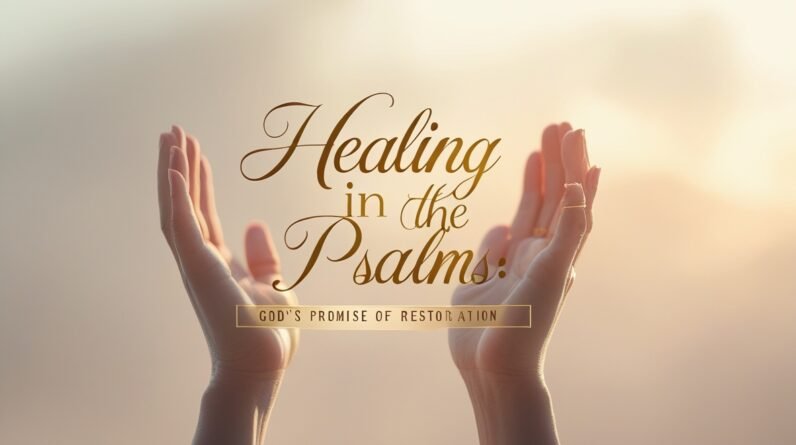7 Life-Changing Promises Of God Found In The Psalms
You’re about to walk through seven life-changing truths that can steady your heart, strengthen your faith, and reshape how you live day to day. The Psalms are packed with pastoral comfort, raw honesty, and divine assurance. When you study the promises of God in Psalms, you discover God’s heart for you—His presence, provision, protection, forgiveness, peace, deliverance, and unfailing love. These are not abstract ideas; they’re practical promises you can claim, pray, and live out this week.
Take this like a bedside conversation with a trusted pastor. I’ll point you to the verses, show you what they mean, and give you concrete ways to respond. Let’s open your heart to the promises of God in Psalms and let them change your life.
Why the Psalms matter for your life today
The Psalms were written across decades, in seasons of triumph and tragedy. They’re prayers, hymns, and honest dialogues with God. When you turn to the Psalms, you’re reading Scripture that expresses what real people felt—fear, joy, despair, gratitude—and how God responded. That’s why these promises of God in Psalms are so powerful: they were written for people like you and me who need hope and direction.
When you study the Psalms, you’ll notice repeated themes—God is our shepherd, refuge, rock, and savior. Those repeated assurances are not accidental; they’re meant to form you. Keep that in mind as you walk through each promise below.
1. Promise: God Will Provide for You
What the Psalm says
One of the most famous assurances in Scripture is the picture of God as your provider. “The Lord is my shepherd, I lack nothing” communicates a promise that God meets your needs. See the verse here: Psalm 23:1.
Why this matters to you
You live in a world of anxieties—bills, job uncertainties, family needs. The promise of provision in the Psalms isn’t a magic bullet to wealth, but it is a rock-solid claim that God will meet your needs according to His wisdom and timing. When you hold onto this promise, your worry begins to shift toward trust. You’ll start making decisions from the place of God’s provision, not from panic.
How to claim it this week
Prayerfully remind God of this promise every morning. Thank Him for what He has already provided and ask for wisdom about what you need today. Practical steps matter: budget with faith, seek wise counsel, and give generously when you can. Remember, when you trust this promise, your actions will follow your faith.
A short pastoral prayer
Lord, help me trust you as my Shepherd. Show me what I need and give me peace that you will provide. Amen.
(Here you claimed one of the promises of God in Psalms. Keep reading—there are six more.)
2. Promise: God Is With You in the Darkest Valleys
What the Psalm says
David paints a powerful image of God’s presence even in the scariest moments: “Even though I walk through the darkest valley, I will fear no evil, for you are with me.” Read it here: Psalm 23:4.
Why this matters to you
You’re going to have valleys—illness, grief, betrayal, loneliness. The Psalms don’t promise you’ll never walk through them; they promise you won’t walk through them alone. That transforms how you endure suffering. Presence is often more powerful than answers. When you truly believe God is with you, fear loses its authority.
How to experience God’s presence
Practice a simple discipline: name your fear aloud and then speak the promise back to God. Use Psalm 23:4 as a breathing prayer—inhale, “Even though I walk through the darkest valley,” exhale, “you are with me.” Repeat it until your heart steadies. Also, find spiritual friends who will pray with you and remind you of God’s nearness.
A short pastoral prayer
Father, when I’m afraid and alone, remind me that you walk with me. Let your presence bring comfort and courage. Amen.
(You’ve just leaned into another of the promises of God in Psalms. Keep pressing in—there’s hope ahead.)
3. Promise: God Protects and Covers You
What the Psalm says
Psalm 91 offers a rich promise of divine protection. It opens with, “Whoever dwells in the shelter of the Most High will rest in the shadow of the Almighty,” and continues by assuring that God will be your refuge and fortress. Read the opening promise here: Psalm 91:1-2.
Why this matters to you
Protection doesn’t always mean avoidance of trouble. It means God is sovereign over your circumstances and can keep you, strengthen you, or bring deliverance. Knowing you have a refuge impacts your decisions: you live with courage instead of paranoia, you take reasonable steps for safety while trusting God with outcomes.
How to walk in God’s protection
Cultivate intimacy with God—dwelling means relationship. Regularly read protective promises and thank God for them. When you face fear, remind yourself of Psalm 91. Pair trust with wise action: seek partnerships, take sensible precautions, and rely on prayer.
A short pastoral prayer
Lord, be my refuge and fortress. Help me live with courage in the face of fear, trusting your protection. Amen.
(This is one of the promises of God in the Psalms that can steady you when storms come. Let it sink in.)
4. Promise: God Forgives and Shows Mercy
What the Psalm says
One of the most comforting promises in the Psalms is the assurance of God’s mercy and forgiveness. “The Lord is compassionate and gracious, slow to anger, abounding in love.” See the passage here: Psalm 103:8-12.
Why this matters to you
Guilt can be a heavy burden. Maybe you’ve failed, made poor choices, or hurt someone you love. The Psalmist reminds you that God’s mercy is greater than your guilt. Forgiveness doesn’t erase consequences, but it removes the chains of shame and opens the door for restoration.
How to accept God’s forgiveness
Own your mistakes, confess them to God, and accept His forgiveness. If you need to, seek reconciliation with the person you hurt. Practice daily gratitude for God’s mercy—name specific ways He has forgiven you. This will free you to serve and love without the crippling weight of shame.
A short pastoral prayer
Merciful God, thank you that your love covers my sin. Teach me to live in the freedom of your forgiveness and to extend that mercy to others. Amen.
(You’ve just embraced another of the promises of God in Psalms—let it free you.)
5. Promise: God Hears Your Prayers and Delivers You
What the Psalm says
David and other psalmists consistently testify that God hears the cries of the righteous and answers with deliverance. “The righteous cry out, and the Lord hears them; he delivers them from all their troubles.” See the verse here: Psalm 34:17.
Why this matters to you
When you pray, you want to know someone’s listening. The Psalms assure you that God hears and cares about your pain. Deliverance may look different from what you expect, but God’s attention to your cry means you are not forgotten. This promise gives you the courage to call out to God in despair and expect a response.
How to pray with expectation
Be specific when you pray. Tell God your pain, name the need, then wait. Expect answers sometimes immediately, sometimes gradually. Record answered prayers to build confidence. If deliverance isn’t immediate, ask God for strength, wisdom, and the ability to trust Him through the process.
A short pastoral prayer
Lord, I cry out to you because I trust you hear me. Bring your deliverance according to your will and timing. Give me patience and faith as I wait on you. Amen.
(This is one of the promises of God in the Psalms that will keep you persistent in prayer. Keep asking, keep believing.)
6. Promise: God Gives Peace and Rest
What the Psalm says
The Psalms point you to a place of rest and peace that comes from trusting God. “I will lie down and sleep in peace, for you alone, Lord, make me dwell in safety.” Read it here: Psalm 4:8. Another verse that guides your spirit to rest is, “Find rest, O my soul, in God alone; my hope comes from him.” Psalm 62:5.
Why this matters to you
You can be busy, worried, and restless. But peace is not merely the absence of problems; it’s the presence of God in your circumstances. When you appropriate the promise of peace, your emotions and decisions grow steadier. You sleep better, love deeper, and lead with a calm confidence that affects everyone around you.
How to cultivate God’s peace
Make quiet time nonnegotiable. Start your morning sitting with these verses and asking God for His peace. Practice gratitude—list three things God has done for you today. When anxiety rises, speak Psalm 4:8 aloud. Trust takes time, but repeated practice of these habits trains your soul to rest.
A short pastoral prayer
God of peace, teach my heart to rest in you. Calm my anxious thoughts and help me live from your peace each day. Amen.
(You’ve received one more of the promises of God in Psalms—let it settle your soul.)
7. Promise: God’s Faithful Love Endures Forever
What the Psalm says
If there’s one refrain you can anchor your life to, it’s the everlasting nature of God’s love. The Psalmist writes over and over, “His love endures forever.” See the refrain here: Psalm 136:1. The Psalms also remind you that God’s goodness and love are constants: “[The Lord is] good; his love endures forever.” Psalm 100:5.
Why this matters to you
The endurance of God’s love means your life is never outside the boundary of God’s care. Even when you fail, God’s steadfast love persists. This transforms how you face regrets, losses, and unanswered questions: you can risk faith because you are anchored to an unchanging love.
How to live in the reality of God’s faithful love
Memorize Psalm 136:1 or Psalm 100:5 and repeat it in moments of doubt. Let God’s steadfast love be the lens through which you view your identity. If you’re tempted to find approval in performance, remind yourself that God’s love is not performance-based—it’s a gift. Then, live generously because you’ve been loved first.
A short pastoral prayer
Lord, thank you that your love never stops, never fails, and never gives up on me. Help me reflect that love to others today. Amen.
(You’ve now walked through the final of the seven promises of God in Psalms. Let that truth settle deep.)

How to Practice These Promises Daily
Build a simple daily rhythm
Start each day by reading one of the Psalms tied to these promises. Speak it aloud. Write a one-sentence application—how will you live today differently because this promise is true? Practicing small, daily rhythms shapes your soul more than occasional Bible binges.
Use prayer with purpose
When you pray, include a verse from the Psalms. For example, use Psalm 23:1 when praying about provision, or Psalm 91:1-2 when asking for protection. Praying Scripture helps your prayers align with God’s promises and strengthens your faith.
Engage community
Tell a trusted friend which promise you’re claiming and ask them to pray with you. Church community helps you keep these promises active in real life—accountability, encouragement, and testimony multiply faith.
(These are practical ways to live into the promises of God in Psalms so they aren’t merely concepts but life-transforming realities.)
When the Promise Feels Distant
Be honest with God and yourself
The Psalms themselves model honest lament. If a promise feels distant, tell God. Cry out like the Psalmists did. That honesty is not a lack of faith; it’s faith expressed in transparency. God welcomes your raw emotions.
Remember timing and mystery
God’s timing isn’t always your timing. Some promises are experienced now; some are secured for eternity. Trust God’s character—His faithfulness is not dependent on your understanding. Cling to the promise that He is at work even when you can’t see it.
Keep watching for small answers
Sometimes answers come in small, quiet ways—peace in the night, a helpful word from a friend, a new door opening. Celebrate those moments. They are God’s fingerprints, confirming the promises you’re holding.
(When you practice this posture, you will notice the promises of God in Psalms moving from doctrine into daily hope.)
A Final Charge: Live Intentionally in These Promises
These seven promises are not merely inspirational quotes to hang on your wall. They’re the lifeblood of a resilient faith. When you intentionally claim the promises of God in Psalms, your life becomes anchored in hope, not chaos. You will make decisions from a place of divine assurance rather than fear.
- Decide today which promise you need most.
- Memorize the related Psalm verse.
- Share it with someone who will pray for you.
- Live one concrete action that flows from that promise.
If you do these things consistently, the Psalms won’t just comfort you—they’ll transform you.
(You’ve now tasted how the promises of God in Psalms can reshape your days and steady your heart. Let them settle and bear fruit.)
Closing Prayer and Invitation
Lord, thank you for the promises you placed in the Psalms—promises of provision, presence, protection, forgiveness, hearing, peace, and unfailing love. Help the reader live by these truths. Strengthen their faith, soothe their fears, and use these promises to guide their steps. Amen.
Explore More
For further reading and encouragement, check out these posts:
👉 7 Bible Verses About Faith in Hard Times
👉 Job’s Faith: What We Can Learn From His Trials
👉 How To Trust God When Everything Falls Apart
👉 Why God Allows Suffering – A Biblical Perspective
👉 Faith Over Fear: How To Stand Strong In Uncertain Seasons
👉 How To Encourage Someone Struggling With Their Faith
👉 5 Prayers for Strength When You’re Feeling Weak

📘 Jesus and the Woman Caught in Adultery – Grace and Mercy Over Judgement
A powerful retelling of John 8:1-11. This book brings to life the depth of forgiveness, mercy, and God’s unwavering love.
👉 Check it now on Amazon
As a ClickBank Affiliate, I earn from qualifying purchases.
Acknowledgment: All Bible verses referenced in this article were accessed via Bible Gateway (or Bible Hub).
“Want to explore more? Check out our latest post on Why Jesus? and discover the life-changing truth of the Gospel!”








